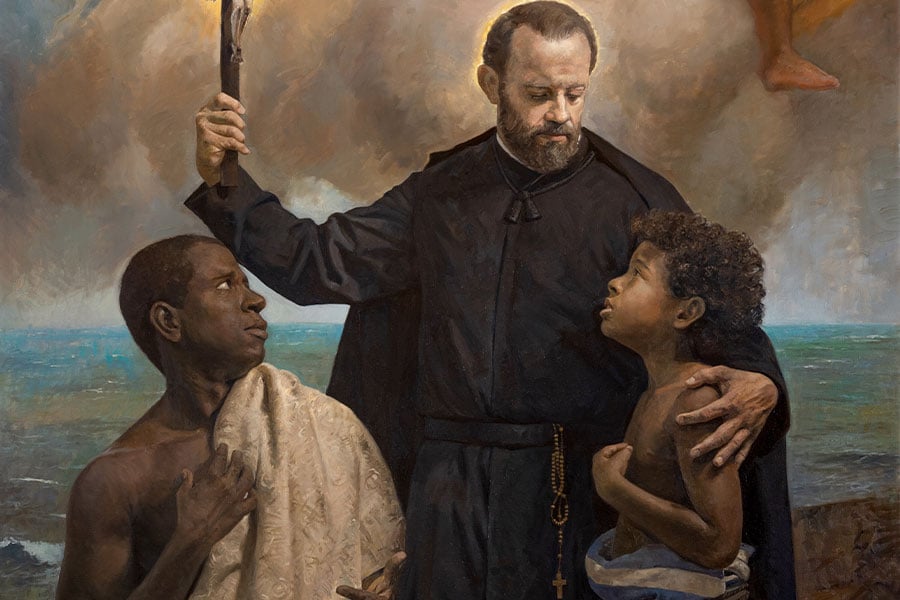Let us lectio: Favored in His eyes

A depiction by Raul Berzosa of St.Peter Claver. (courtesy of Raul Berzosa/RaulBerzosa.com)
The Memorial of St. Peter Claver, September 9, 2020
Steps to Lectio Divina
Start by using these steps to reflect on the Scripture verse. Then read my meditation slowly.
Lectio: Having asked for the grace to hear God's word, read the passage twice.
Meditatio: During the second reading, pause whenever so moved and reflect on a word, a sentence, or an image that strikes you.
Oratio: Speak directly to God, and open your reflection to Him.
Contemplatio: Listen contemplatively for any response God might choose to make. Remember that God responds to us at times with loving silence.
The Scripture
From the Gospel for September 9, 2020, Memorial of St. Peter Claver (Luke 6:20-26)
Raising his eyes toward his disciples Jesus said:
“Blessed are you who are poor, for the Kingdom of God is yours. Blessed are you who are now hungry, for you will be satisfied. Blessed are you who are now weeping, for you will laugh. Blessed are you when people hate you, and when they exclude and insult you, and denounce your name as evil on account of the Son of Man.
Rejoice and leap for joy on that day! Behold, your reward will be great in heaven. For their ancestors treated the prophets in the same way.
But woe to you who are rich, for you have received your consolation. But woe to you who are filled now, for you will be hungry. Woe to you who laugh now, for you will grieve and weep. Woe to you when all speak well of you, for their ancestors treated the false prophets in this way.”
Reflection
St. Peter Claver was born in 1581 and raised in what is now Catalina, Spain. He spent most of his priestly life heroically seeking out and ministering to the least among him, particularly the slaves who were being offloaded from Africa to the ports of Cartagena, Colombia.
He would even frequently board the ships while the slaves were still shackled in darkness to minister to their immediate needs. Once he had established himself as a person they could trust, he reportedly baptized around 300,000 individuals and would hear the confessions of 5,000 yearly. Beyond that, he would advocate on their behalf to the local political officials and landowners; he spoke against a culture that regarded them as less than human. In these souls, he saw the lost, afraid, abused, abandoned.
Today’s Gospel from Luke is a lesser-known version of the beatitudes, which we typically read from Matthew’s Gospel.
Unlike in Matthew’s account, Luke places this teaching immediately after the calling of the disciples. Thus, Luke’s beatitudes are presented as instructions on what it means to be a disciple of Christ. Once called, the disciples freely follow Him. Christ now makes clear that discipleship entails a reversal of values from what is expected.
The Gospel writer warns against the one who seeks their consolation in earthly comforts, those who do not “set their sights on heaven.” In a biblical context, “blessed” is a term that refers to someone who is “happy” or “fortunate” in God’s sight — close to the heart of Christ and favored in His eyes. This is why so many, out of love of Christ and imitation of Him, have left everything to follow Him. They seek to rely on God in all things to unite themselves more closely to His holy heart.
Those who embrace “holy poverty” have come to profoundly depend on God and rely on Him for their deepest needs. They are also keenly aware that the world does not provide for their needs, but the One who sends the sun and the rain to shine on “the righteous and the unrighteous” (Matthew 5:45).
Beyond this, St. Peter Claver understood the tremendous truth that the beatitudes demand of the disciple: to regard the poorest among us with our greatest care and concern. This pastor demonstrated that to be an imitator of Christ means to look upon others as God would, to see beyond their worth according to the world.
Blessed are they who realize that regardless of their material needs or financial security, it is the Lord and His providential love that provides all for those who seek Him and the Kingdom of God first.
